Draft notes by Ralph Vaughan Williams relating to Cecil Sharp’s English Folksongs (London 1907)
Letter No. VWL151
Draft notes by Ralph Vaughan Williams relating to Cecil Sharp’s English Folksongs (London 1907)
Letter No.: VWL151
[?May 1907]
[Notes on the draft of Sharp’s English folk song: some conclusions, London 1907.
A. Section dealing with Chapters 1 & 2 – not paginated]
p.1 for “I am unable” read “It seems impossible”
p.2 “Peasant song” – This question is rather difficult – the peasantry of England are only a small class – why shd their music be our national musical basis? I think this shd be modified (here and later) unless you explain about the “least common multiple as suggested in my preface” (this also applies later).
p.4 What do you mean by common – do you mean “the people as a whole” or as opposed to the “upper classes”
Chap 2
4a I am not sure that I should leave out all this – it is the bit of F.S.1 study which is already known through Parry’s art of m & other books – If you keep it I shd quote C H H P2 which wd be a good way of seething Somervell3 in his mothers milk.
“even as simple” – why “even” – it is the simplicity of design which is the cause (or rather condition) of the beauty & expressiveness and Beethovens symphonies are broadly equally simple in design
p.5. “At first sight” this may require modification if you put in the introduction I suggested.
Chap.2. p.6
“The distinguishing marks….” I don’t like this classification – & I don’t agree that spontaneity etc are absent from composed music e.g. “Now is the month of maying” last movement of Handels A major sonata, Bach’s B minor suite & lots of others.
“Archives of B.L” substitute “pages of the art music of former generations”
p.7. for “The Grimms held that poetry” read “folk-poetry”?
Wd it be the right place to add here (in this chapter)
(1) That the successive alterations from the supposed original are not corruptions because we presume that there is a natural tendency towards beautiful music in the minds of those who hear & repeat the song.
(2) Will you expand your communal theory by your illustration of the birds – i.e. that only those forces survive which are approved of by the majority.
(3) That this development from a germ is exactly what takes place in a single mind in the case of art-music.
[B. Section dealing with chapters 5-9]
Chap. 5
p.4. “The Greeks” is not a correct antithesis to “the folk” – surely “Greek theorists” or “the Greek writers”.
5. “As in all good melody” – rather arbitrary?
p.7 Why not folk-song examples?
p.12 “modo lascivo” – “modus lascivus”
p.15 last line “by step of a semitone upwards to the tonic yeans4 the desire for the final leading note is no longer forcibly present in a listeners mind” i.e. the reasons are from within not from without as your sentence seems to suggest.
Same sentence for “may lead” read “have led”?
I’m not sure that I should have this chapter on modes at all except a little of it added to the beginning of the next chapter. Though it’s extraordinarily interesting – yet is it quite to the point – are the modes essential to Folk-song? Surely not – you say later on that the majority of tunes are major – unless indeed you say that all pure melody is modal and write about Ionian tunes not major ones.
Chap. 6
p.2. “modo lascivo” – “modus lascivus”?
– “In the modes” – other than major?
I’m not sure about the sentence starting “the partiality of the modes” – especially in a scientific book. Would it not be better to put it thus “The partiality for modes … English musicians as the following quotation from a class singing book proves …”
I should certainly omit the paragraph on p.2a starting “the implication” which is as you say “by the way” and is not germane to the matter in hand.
p.2a “in the modes” – add Mixolydian, Dorian & Aeolian.
P.2 for “queer” read “unexpected”.
p.4 for rustic read countryman.
p.7 for “In classical music” – read “in composed music until quite modern times”
8. “difficult to harmonize” and elsewhere “essentially unharmonic” – then why harmonize them?
for “orthodox” read “usual”.
p.11 “Folk-music has no rules” – no more has art-music – except such as musicians make for their own guidance – and the folk-singer wd surely be much more likely to be bound by tradition than the composer & only unconsciously break away from it.
13.
Tune ‘The hearty good fellow’
– a possible explanation of this is that some other version of the tune may have had the normal cadence  but that the singer not being modally minded made a major cadence – I have heard an example of this where a singer ended modally
but that the singer not being modally minded made a major cadence – I have heard an example of this where a singer ended modally 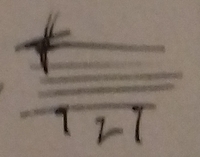 but the chorus altered the cadence to
but the chorus altered the cadence to  .
.
p.18 Quotation from C.H.H.P.2 – this is to my mind quite wrong – it is of course what theorists wd imagine; – that cadences might be supposed to go down – and from this we have the very prevalent idea that the flat 7th rising to the tonic is a sort of sham archaism (whether in melody or harmony) founded on a misapprehension of the nature of the melodic modes – But we practical collectors know that this is not a misapprehension and the [flat]7th does constantly rise to the tonic in folksong – this shd be insisted on.
p.21 “Down in the Groves” – wd it not be simple to write this out in C. with Bb? or to G. with F#.
Ch.7. p.1
_/ the opening sentence and start “The pattern …”
p.3 “Before any thing was known” – this sentence is parenthetical and should be made to appear so.
p.4 To avoid all controversy I shd not use a tune called ‘Erin’s lovely home’ as an English Folk song when there are many others to choose from.
p.5 “folk-composer” – is this a correct expression?
p.5 Point out that the insistence of the opening phrase balances the double-length final phrase.
p.6 Why Keys of Heaven why not Canterbury?
p.9 I don’t quite follow your analysis of Bushes & Briars. I should analyse it thus
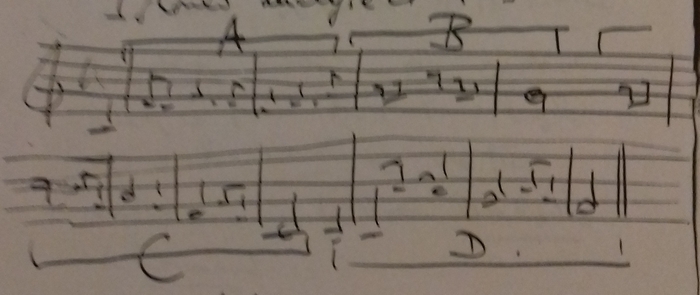
and the repetition of C & D only the usual chorus.
p.12 For a perfect 7 time tune see “The young servant man” in Part 4 of F.S.J.5
p.17 Do not make an antithesis between folk-music and modern music – our contention surely is that the F.S. though old is also new – the true antithesis is between melodic & harmonic.
p.18 The phrase 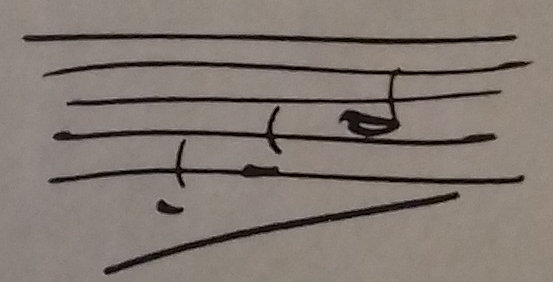 is not the same as
is not the same as 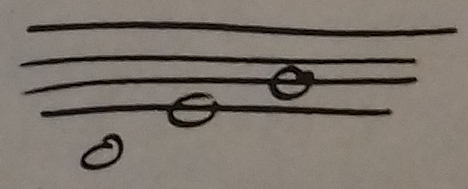 surely?
surely?
Chapter 8
Should you not start by saying that the book really deals with folk-music and that therefore this chapter should not be considered exhaustive but only supplementary to the rest?
p.16 I don’t quite agree about the optimism of the English folk-song – I think how popular “Died for love” sort of songs are & “A maid again I shall never be” etc – also how about Lady Maisey – Bruton Town – Salisbury Plain & all the transportation and murder ballads.
Nor do I agree about the occupation song not being common – e.g.. The Farmer’s Boy & The Painful Plough – which you get everywhere.
– also I got hardly anything but sea songs from the sailors at Lynn.
It seems to me that you have not dealt with the important question for this purpose which is Why have the words become corrupted and not the tunes? & the answer is – I suppose – because of the printer – it seems to me that the history of the ballad sheet shd be given here & not of the unprinted ballad – with an explanation to show that the new printed ballads were set to the old tunes – so that the old tunes have remained while the words have disappeared.
Chap: 9
Opening seems to me too conversational & why “Parson” – at least it is a word I rather dislike in print. Also this way of putting things – which one loves to hear so much when you tell it- somehow looks wrong in cold print – to those who do not know you it might seem a little patronising – I feel that in a book of this kind a much more impersonal method might be better.
Chap.9. p.10
“rarely sings more than one note to a syllable” – I entirely disagree with this. These are 3 ways in which the slurred notes may be used:
(1) in ornament e.g.

See “Moorfields” (F.S.J.)
(2) In passing from one phrase to another e.g.
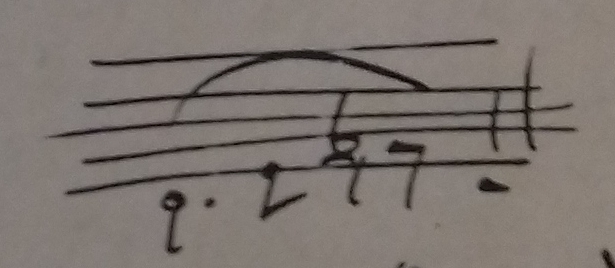
in “come all you worthy Xtians”.
(3) A sort of cadenza introduced for a definitely expressive purpose – e.g. “Bonny Boy” in “English County Songs” – I feel you shd quote this as a particularly fine example.
p.13 I don’t quite like the antithesis between town & country – folk song belongs to the town just as much as to the country.
p.14 I can’t see any reason to suppose that the usual tunes for “Barbara Allen” & “The Bailiff’s dter” aren’t unadulterated folk-tunes – they are to my mind extremely beautiful – and it seems to me to weaken your case not to admit them into the category.
p.16 Is this certain? if not add “probably”.
p.17 I should delete after “not appeal to them” to the end of the sentence.
p.21 “We cannot therefore accept without discrimination”…
see also above about B. Allen & the Bailiffs dter – it seems a pity to condemn these – unless you really think they are poor tunes, which I certainly do not, also Admiral Benbow which I think you will find to carol words in Sandys or Davies Gilberts collections – which are obviously not edited.
By the way this reminds me – won’t you say anything about carols in your chap: on folk poetry – to my mind hardly any ballad poetry is more beautiful than “the 1st Noel” “The Lord at 1st did Adam make” or “The angel Gabriel” or “God rest you merry gentlemen”. Couldn’t you also throughout avoid the word “peasant” – also I don’t care for “the folk” – but I expect that is a peculiarity of mine.
Also there is this point – the country people from whom we get these songs are only a small part of our population – why should their music be essentially our national music? Is it not because it is only there that we can find music in its most primitive state and this is the reason is it not, why we go to them to find out what our national music really is?
p.22 Miller of the Dee
The following which I collected in Sussex the other day may affect your argument.
‘The Miller of the Dee’
Sung by Mr Penfold, Landlord of the Plough, Rusper, Sussex April 1907
AEOLIAN – slowly
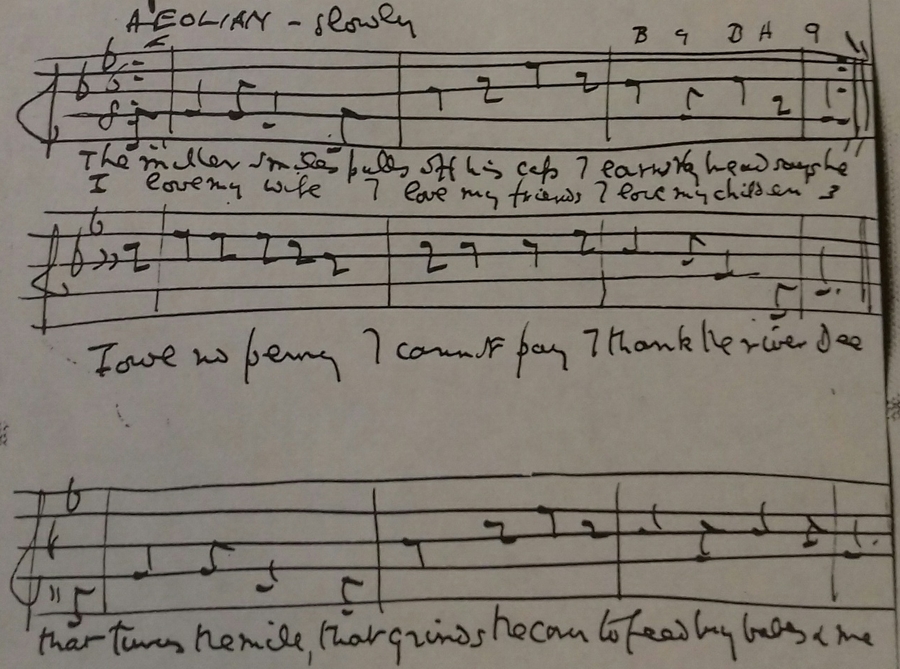
p.23 line 3 for “recently” read “about 15 years ago”.
24. I think these remarks about Chappell go too far – his book contains several tunes which are still remembered by oral tradition though they are also in print (e.g. Cupids Garden and ‘Of all the birds’) – perhaps it will do to add “the few purely traditional airs” at the end of the paragraph.
One or two general remarks
(1) It seems to me that some of the statements are too dogmatic and too generalizing – we must realize that when this book comes out a whole lot of people will be doing their best to trip you up – and if you are wrong in some tiny side issue they will on that account throw doubt on the accuracy of the whole book – it strengthens one’s case so much always to fully admit the exceptions which prove the rule.
A “probably” or a “ most likely” or “exception must be made in the case of” wd I think strengthen your argument tremendously.
(2) Take care that people do not say “this is an essay not on English Folksong but on Somerset Folksong – you shd explain – what of course is obvious to us that you use your own collection because its the largest and also because personal experience is so important a factor in the argument. Also you must be prepared for nasty people to say that you are trying to advertize F.S.F.S.6 – I think that where possible you shd print the tune and not refer to it.
[C. Section dealing with introduction and Chapters 10-12]
Introduction
There is a lot of this which it seems to me had better go in the text
especially
p.1 & 2 down to manifestly – why not begin there with a very few words to explain why “manifestly”
most of the sentence starting “the major portion”
all pages 9 & 10 & 11 down to “Society”
p.1 “only a few years” how many? 1,10,20 or 50?
p.3 I suppose I’m prejudiced – but I lose all self-control when I see the expression “Merrie England” (at all events why not “merry”?) – it seems to my mind connected with Ruskinianism and “Home industries” and all the worst kind of obscurantism – if the folksong has nothing to say to us as we are now – without a sham return to an imaginary (probably quite illusory) arcadia of several centuries ago – if the folksong means this then I would burn all the collections I could lay my hands on and their singers with them – please forgive this splenetic outburst but that particular expression is to me (the other way out) like the blessed word Mesopotamia – and, I say, connects the folksong (and, if you use the word, yourself, by implication) with the worst of its hangers on and camp-followers – Amen.
p.6. Better say why you have taken examples from your own collections.
Chap. 10.
p.4. and elsewhere – personally I shd leave out (in a scientific book) the laudatory references to “the helpful cooperation of” – “the well-known collector” etc – I can’t give a reason, but somehow it doesn’t feel right.
p.5 etc. Unless you’ve already said it elsewhere I shd like more stress laid on the a priori reason for believing that folk-songs are not “corrupted” but are evolved – mainly the belief that music is in its germ a natural utterance & not an artificial one.
p.6 & 7. I don’t like either of your examples – in the first the variants are not close, but almost distinct tunes, in the other one version obviously is a corruption.
9. authenticity – but surely your whole book is written to prove that the expression “authentic” is a contradiction in terms when applied to the folk song.
Chap. 11
p.3 We cannot tell that a F. song is old – but we can often tell that it is not old can’t we?
p.4 “modern” scales – is this correct?
p.6 I should omit from “It is quite possible” to the end of the sentence – I don’t see the point – and it looks as if you were having a dig at some one – generally do omit everything that is not germane to the matter – the book is quite splendid, I think, – if I may say so – but if it is crammed too full people won’t see the wood for the trees.
Chap 12.
p.7 I shd leave out the reference to Miss Keeton & her article – she is not worth it – and people will think her more important than she is – also this is a book of permanent scientific value – not a pamphlet for the moment – I think it is most important in this book to keep the high level and not to descend to details as to who said this & who said that.
p.14
1. I’ve already explained my view about musical (composers) education – & we’ve talked it over – but I think your point of view shd be put.
2. I entirely disagree with all this (sentence starting “there are many ways”) – indeed all about patriotism – but that’s neither here nor there.
I should omit sentence at top of p.26 which will cause the unwary to blaspheme.
p.24 I rather feel the quotations are not in place in a permanent book on folk-song – all right in a pamphlet or newspaper article – also the style of both of them annoys me & who the deuce are Wippet and Jones?7
p.25 do do
p.26 Do leave Mr Ilwains8 high faluting stuff out of it – I know nothing about him except his writings – but they make me mistrust him thoroughly – I wish you’d suppress him when he tries to write – he’ll ruin the cause – one or two people have expressed as much to me and said they shd think you were enough master of the situation to deal with him with a master hand.
And finally I do beg of you to leave the B. of E. wrangle9 out of this book – you’ve said all that need be said about that in your articles & letters – in a few years time this part of the book will be out of date – & will weigh like lead on the rest.
Your book is to show, exactly, what in your opinion a folk song is – and how it differs from other music – and how it has its place in the educational scheme – but it is not in place in this book to show up the stupidities of a particular set of men at a particular moment – that you have done elsewhere.
Do keep the high ground & don’t let people think that the subject consists of friction on small details with particular people.
[D. Draft for text not apparently belonging to any of the other sections but found in the packet]
We must, then, look to the musical utterances of that class of the community who are least affected by extraneous educational influences (not only musically but generally educational) namely the aboriginal inhabitants of remote country districts – their music, if they have any, will be a purely natural instinct, if they have none then we can be sure that the educated music of that country will be, comparatively, worthless.
Now as a matter of fact in every land we do find music of a distinctive and very beautiful quality prevalent among the country people (“Das Volk”) of any nation, bound it is true by certain limitations, but of a beauty and character of its own which is not entirely shared by the educated music of the same nation. This spontaneous utterance is called the “folk-song …10
1. Folk song
2. Charles Hubert Hastings Parry. His book The evolution of the art of music was first published in 1893.
3. Arthur Somervell, the composer.
4. sic. Archaic word meaning to ‘bring forth’
5. Folk Song Journal
6. Folk Songs from Somerset edited by Cecil Sharp and Charles Marson, published ca. 1905
7. These names may not be accurately transcribed.
8. Herbert McIlwaine, Musical Director of the Espérance Club, a society founded by Mary Neal in Cumberland Market with the aim of improving the social life of working girls of London. See Georgina Boyes, The imagined village: culture, ideology and the English folk revival (Manchester 1993), p.72.
9. The Board of Education had published a report in 1905 recommending national and folk songs as the basis for teaching music in schools. Cecil Sharp had strenuously opposed the notion of using national as opposed to folk songs for this purpose. The Folk Song Society had supported the report and Sharp had broken away from it.
10. Presumably the draft for a lecture/article.
-
To:
-
From:
-
Scribe:
-
Names:
-
Subject:
-
Format:
-
General Notes:
These notes kept together at Cecil Sharp House appear not to have been all sent at once but in three parts, attached to VWL150 – one, transcribed first, dealing with chapters 1 and 2, the second with chapters 5-9, and the third dealing with the Introduction and chapters 10-12. A final leaf kept with the other pages is transcribed here, but does not appear to be part of the same letter.
-
Location Of Original:
-
Location Of Copy:
-
Shelfmark Copy:MS Mus. 1714/1/26, ff. 66-102; also part at MS Mus. 1714/2/3/2, ff. 103-127


